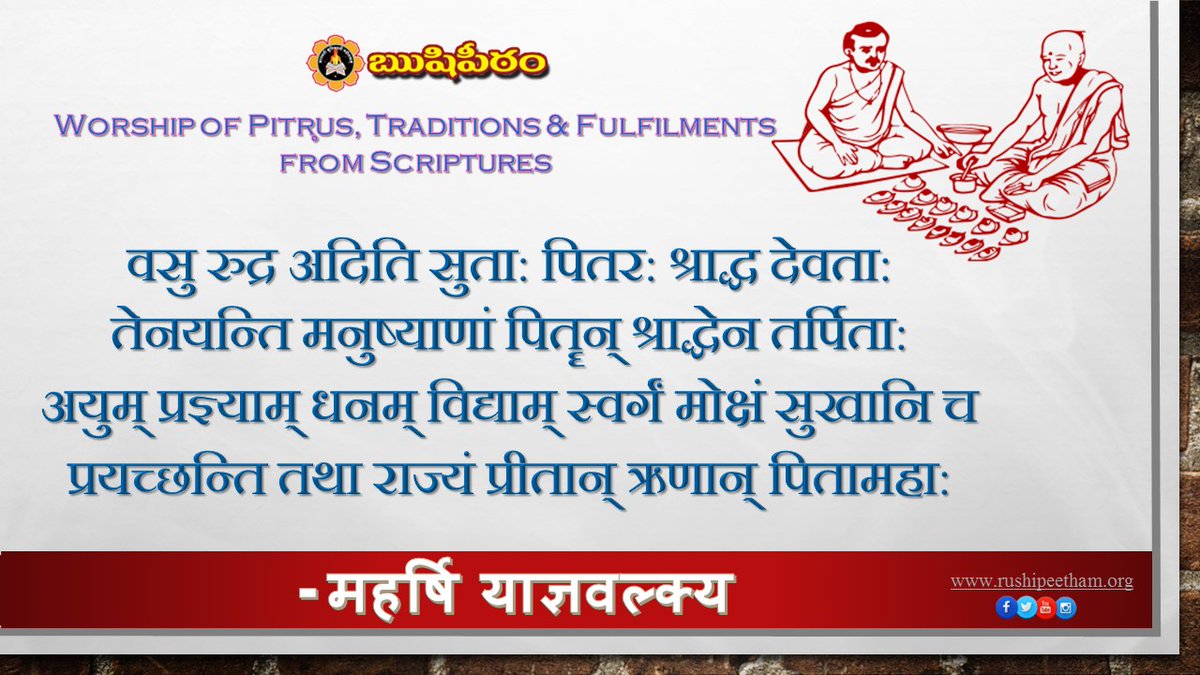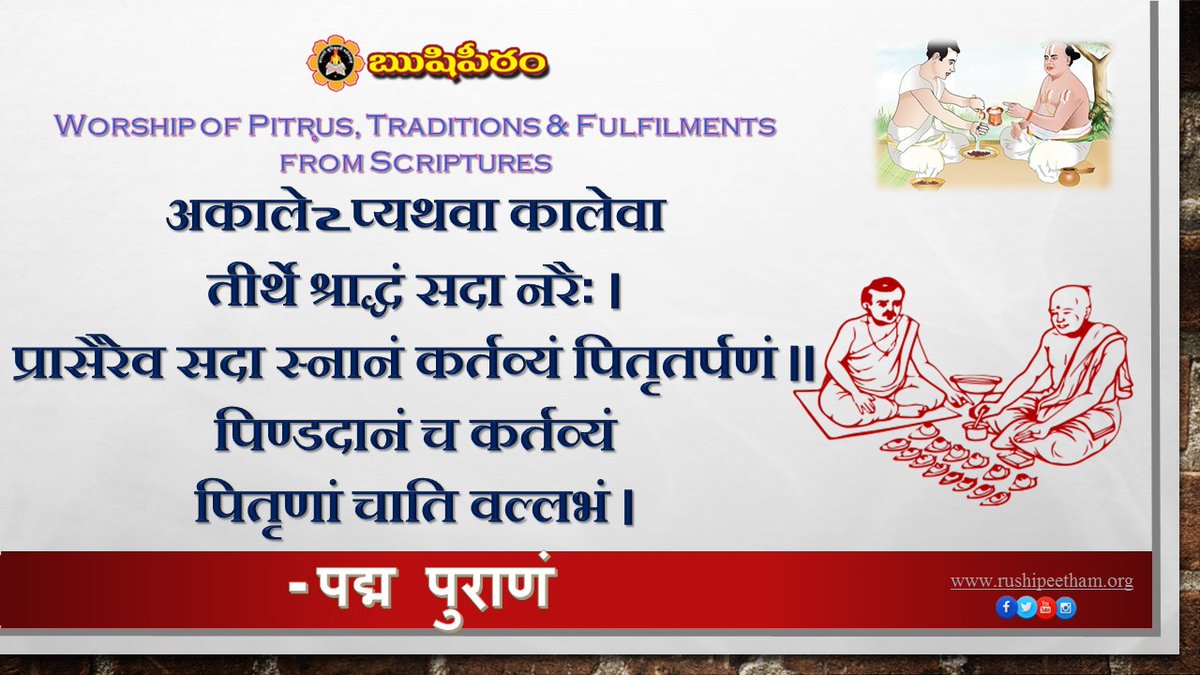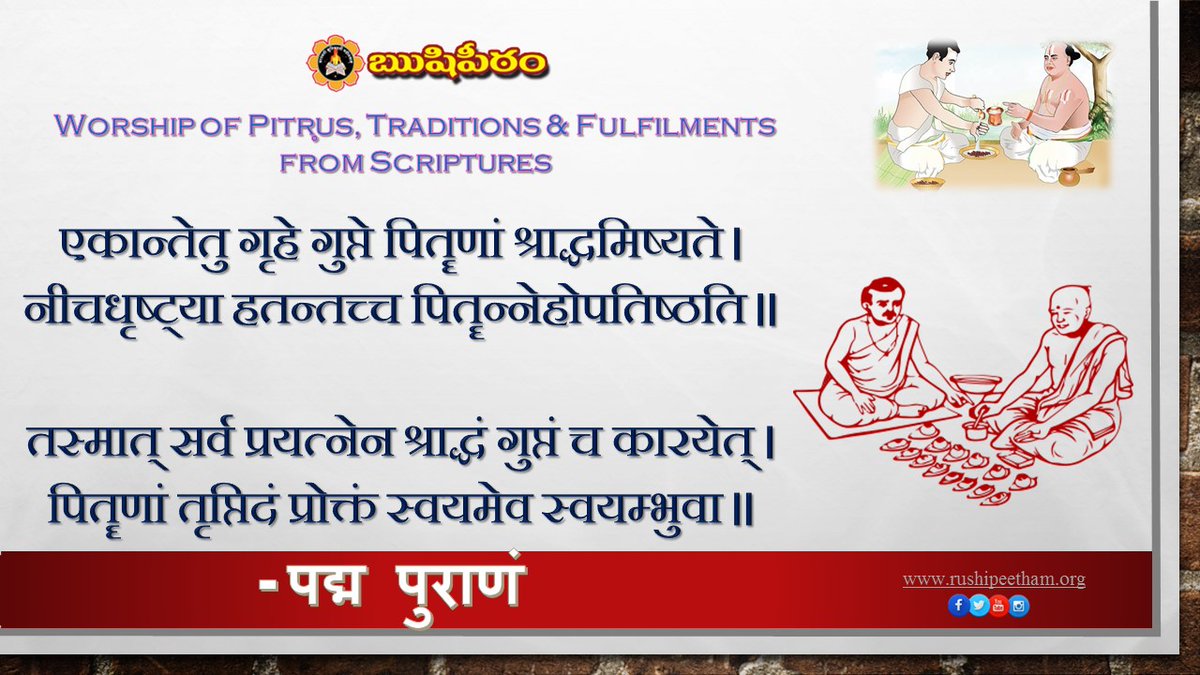
Worship of Pitr̥us:
Many are under the impression that ‘Pitr̥us’ means one’s ancestors. But, the scripts of Sanatana Dharma have unfolded vast knowledge about Pitr̥us. There exist ‘dēva pitr̥us’, ‘manuṣya pitr̥us’ etc. Even gods have pitr̥us. Pitr̥us are venerable even for gods.
Many are under the impression that ‘Pitr̥us’ means one’s ancestors. But, the scripts of Sanatana Dharma have unfolded vast knowledge about Pitr̥us. There exist ‘dēva pitr̥us’, ‘manuṣya pitr̥us’ etc. Even gods have pitr̥us. Pitr̥us are venerable even for gods.

Entire structure of Pitr̥us is organized as 33 gaṇas, which are grouped prominently as Vasu, Rudra, and Aditya. Pitr̥us are also termed as ‘mūrta’ i.e. have a bodied form, and ‘amūrta’ i.e. those who do not require a body, but exist as an embodiment of energy.
Scriptures mention that it would be amazing to note that once the consciousness leaves the body, even the Atma won't have any knowledge about the next stage where it reaches.
It is decided only by the actions performed while that is embodied on this earth. Yājñavalkya mentions👇
It is decided only by the actions performed while that is embodied on this earth. Yājñavalkya mentions👇

Vasu, rudra, and aditi sutā: i.e. āditya are called śrāddha dēvatā: i.e. the presiding deities of śrāddha, the offering done to one’s ancestors.
If one performs all the stipulated duties towards one’s ancestors with devotion and perfection, these deities are pleased and grant..
If one performs all the stipulated duties towards one’s ancestors with devotion and perfection, these deities are pleased and grant..
them longevity, intellect, wealth, knowledge, heaven, pleasures, and even salvation.
Performing rituals to satisfy the departed ancestors is deep rooted in Sanatana Dharma. In stricter terms, it can be said that anyone neglecting this essential and stipulated duty will not be
Performing rituals to satisfy the departed ancestors is deep rooted in Sanatana Dharma. In stricter terms, it can be said that anyone neglecting this essential and stipulated duty will not be
deemed to be completely living as a Hindu, nay human being.
Apart from performing the annual ceremony to departed parents and other ancestors as required, it is also important to perform ‘Tīrthavidhi’ whenever visiting any sacred places such as the banks of Ganga, Yamuna,..
Apart from performing the annual ceremony to departed parents and other ancestors as required, it is also important to perform ‘Tīrthavidhi’ whenever visiting any sacred places such as the banks of Ganga, Yamuna,..
Godavari etc., and holy pilgrimage centers such as Tirumala, Kasi etc. In fact, ‘Sri Venkatachala Mahatmyam’ elucidates in great detail the rituals to be performed at various tirthas present on Tirumala.
Also, during the ‘Mahālaya Pakṣa’, it is prescribed to perform rituals..
Also, during the ‘Mahālaya Pakṣa’, it is prescribed to perform rituals..
such as tarpana etc. to satisfy the departed ones. Apart from the above, our scriptures also decree performing tarpans on a daily basis & especially on a new moon day with sesame seeds.
Pitr̥̄us have the power to fulfill all the wishes. prayer to Pitr̥̄us is done with the sloka👇
Pitr̥̄us have the power to fulfill all the wishes. prayer to Pitr̥̄us is done with the sloka👇

Traditions – Fulfilments
Satisfied with the śrāddha and other related acts, the pleased pitr̥ dēvatas fulfill the wishes of those who performed them. Besides, they not only bestow virtuous children, wealth, paddy, health, fame, but also heaven & other worlds.
1) Slokas👇

Satisfied with the śrāddha and other related acts, the pleased pitr̥ dēvatas fulfill the wishes of those who performed them. Besides, they not only bestow virtuous children, wealth, paddy, health, fame, but also heaven & other worlds.
1) Slokas👇


2) Sloka (Image):
While on pilgrimage, irrespective of auspiciousness of time, one should perform the stipulated ablution, pitr̥tarpaṇaṁ, and piṇḍadānam. This immensely pleases the pitr̥us.
While on pilgrimage, irrespective of auspiciousness of time, one should perform the stipulated ablution, pitr̥tarpaṇaṁ, and piṇḍadānam. This immensely pleases the pitr̥us.

3) Sloka (Image):
During Mahālaya pakṣa, one should leave out the chaturdasi day and begin the pitr̥ukārya on Padyami day. This should be done on Chaturdasi day only for those who death was caused due to weapons.
During Mahālaya pakṣa, one should leave out the chaturdasi day and begin the pitr̥ukārya on Padyami day. This should be done on Chaturdasi day only for those who death was caused due to weapons.

4) Sloka (image):
One should leave out Chaturdasi during the Mahālaya pakṣa and perform the pitr̥ukārya on tithis from Dasami. These tithis are auspicious and there is no other best time that matches this period.
One should leave out Chaturdasi during the Mahālaya pakṣa and perform the pitr̥ukārya on tithis from Dasami. These tithis are auspicious and there is no other best time that matches this period.

5) Sloka (image):
Since Sun radiates resplendently in the eighth muhūrta from sunrise, that duration is mentioned as ‘Kutapa kāla’. Performing any action intended for pitr̥u during this period yields infinite merits.
Since Sun radiates resplendently in the eighth muhūrta from sunrise, that duration is mentioned as ‘Kutapa kāla’. Performing any action intended for pitr̥u during this period yields infinite merits.

6) Sloka (Image):
In śrāddha, 3 things are sacred
1. Daughter’s son.
2. Noon time &
3. Sesame.
Those performing the ritual should have 3 mail qualities
1. Śaucha (External & internal purity)
2. Free from anger &
3. Not rushing to finish the ritual in a hurried manner.
In śrāddha, 3 things are sacred
1. Daughter’s son.
2. Noon time &
3. Sesame.
Those performing the ritual should have 3 mail qualities
1. Śaucha (External & internal purity)
2. Free from anger &
3. Not rushing to finish the ritual in a hurried manner.

7) Sloka (image):
Pitr̥ukāryas should be done secretly in a quiet place without inviting other’s attention. If this is not done in this manner, pitr̥us shall not grace the occasion. Hence, one should make efforts to this effect to perform them clandestinely.
Pitr̥ukāryas should be done secretly in a quiet place without inviting other’s attention. If this is not done in this manner, pitr̥us shall not grace the occasion. Hence, one should make efforts to this effect to perform them clandestinely.

Why Pitr̥ukarmas are called ‘śrāddhaṁ’?
Any ritual such as hōma, piṇḍa dāna, brāhmaṇa bhōjanaṁ are called ‘śrāddhaṁ’. (Sloka in image)
‘śrāddha’ means being faithful. Faithful to direct evidence in case of physical matters, and scriptural decrees in case of divine matters.
Any ritual such as hōma, piṇḍa dāna, brāhmaṇa bhōjanaṁ are called ‘śrāddhaṁ’. (Sloka in image)
‘śrāddha’ means being faithful. Faithful to direct evidence in case of physical matters, and scriptural decrees in case of divine matters.

Because divinity can’t be directly experienced by commoners, scriptural evidence is essential. This is nothing but keeping utmost trust in the scriptures without neither reservations nor questions. That is true ‘śrāddha’. Anything done with that ‘śraddha’ is ‘śrāddham’.
‘śraddha’ is essential even for performing rituals such as Yajna, Yaga, and others. One should certainly perform the stipulated Pitr̥ukarmas without fail. Else, there will be bad repercussions. Hence, these acts are distinctly mentioned as ‘śrāddha karmas’.
• • •
Missing some Tweet in this thread? You can try to
force a refresh









